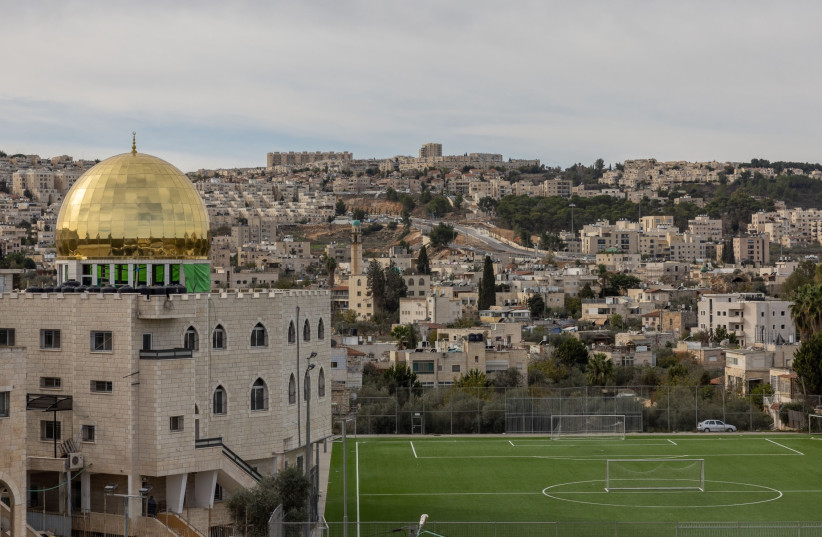Waleed Abu Tayeh, an Arab-Israeli lawyer from east Jerusalem, is planning to run in the election for the Jerusalem Municipality, slated for October 2023.
Abu Tayeh, 68, who is born in Nazareth, told The Jerusalem Post that he is currently in the process of forming a list to contest the municipal election, which has regularly been boycotted by the vast majority of the Arab residents since the annexation of Jerusalem in 1968.
Abu Tayeh, who moved to Jerusalem more than three decades ago, said the new list would consist of Arab-Israelis living in east Jerusalem. Most of the residents of east Jerusalem don’t have Israeli citizenship, and as such can’ vote in the general election. However, they are entitled to vote in the municipal election in their capacity as permanent residents of the city.
It's believed that several thousand Arab-Israelis reside in east Jerusalem, as well as the Israeli part of the village of Beit Safafa.
Why do Arab-Israelis boycott Jerusalem's municipal elections?
The Arabs have boycotted the municipal election in Jerusalem because they don’t recognize the annexation of east Jerusalem to Israel.

In the past, the Palestinian Authority and several Palestinian factions have strongly opposed Arab participation in the vote on the grounds that such a move would be interpreted as recognition of the annexation of east Jerusalem. The PA and the factions often refer to the Jerusalem Municipality as the “occupation municipality” although it employs thousands of Arab workers.
"My decision to participate in the election does not mean that I recognize the Israeli occupation of Jerusalem,” Abu Tayeh, a resident of Bet Hanina in northern Jerusalem, told the Post. “I want to serve the Arab residents of the city, who are deprived of many basic municipal services and suffer from discrimination in many fields, especially the construction of homes and lack of investment.”
Abu Tayeh is not the first Arab to announce his intention to run in the municipal election. In 2018, Ramadan Dabash, a businessman from the village of Sur Baher, led a party called “Jerusalem, My Town.” The party garnered only some 3,000 votes and did not make it into the municipal council.
In addition to Dabash’s party, another list called “Jerusalem Is Ours” led by journalist Aziz Abu Sarah also announced its intention to run in the election but withdrew before the vote.
In 1998, Moussa Alayan, a lawyer and insurance agent from Beit Safafa, also ran in the election but failed to meet the minimum threshold for a seat in the council. In 2008, Zuheir Hamdan, a community leader from Sur Baher, announced his candidacy for mayor but withdrew before the vote, apparently under pressure from the PA.
Many Arabs want to take part of democratic process, Abu Tayeh says
Abu Tayeh said he believes the Arabs are making a big mistake by boycotting the election. In fact, he said, “many Arabs want to participate in the election, but are hesitant to do so.”
He pointed out that Arab Israelis have never boycotted the municipal elections in Israel. “Sheikh Raed Salah, head of the Islamic Movement-Northern Branch, was the mayor of Umm al-Fahem for many years,” Abu Tayeh noted. “I’m originally from Nazareth, where the Arabs have always participated in the elections for the municipality and Knesset. There is no reason why Arab citizens living in Jerusalem should not participate in the local election. The Arabs in Jerusalem pay a lot of taxes, but get little services from the municipality.”
Abu Tayeh said his list wants to help solve some of the major problems facing the Arab residents of Jerusalem, particularly the demolition of illegal houses and the school curriculum. Recently, the PA and parents of schoolchildren in east Jerusalem protested Israeli efforts to introduce changes to the textbooks, dubbing them an attempt to “Judaize” the education system and “distort the Palestinian narrative and history.”
Abu Tayeh said he has consulted with several prominent political activists from east Jerusalem regarding his decision to run in the municipal election. “They told me that it would be a good idea if we were headed toward a one-state solution,” he added. “They said that under a one-state solution, they would even support the idea of Arabs running for the election in [the haredi city of] Bnei Brak.”
Asked if he was not afraid of threats by the PA and other Palestinian parties, Abu Tayeh replied: “The Arabs have been making mistakes for more than 100 years because they keep saying no and no. It’s time for change and I believe that we can do a lot to help the Arab residents of Jerusalem.”
